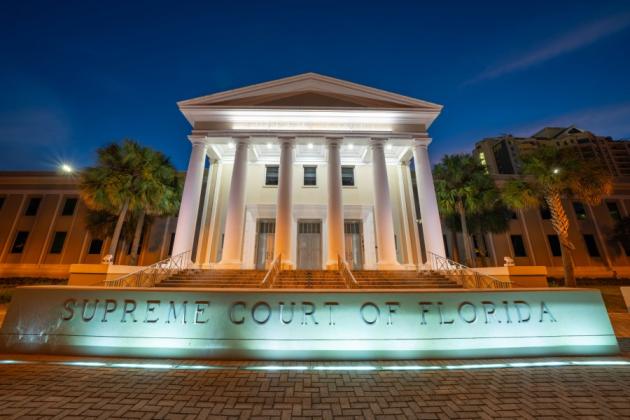Two decisions by the Florida Supreme Court Monday cleared the way for a pair of constitutional amendments to appear on the November election ballot — setting the stage for some fierce political fights over the coming months.
The Court upheld a law that will lead to preventing abortions after six weeks of pregnancy — but also cleared the way for voters to decide in November whether they want to enshrine abortion rights in the state Constitution. A divided Court Monday also approved placing on the November ballot a proposed constitutional amendment aimed at allowing recreational use of marijuana.
In a 6-1 decision, justices ruled that a privacy clause in the state Constitution does not protect abortion rights. That overturned legal precedents dating to 1989 and effectively gave the go-ahead to a six-week abortion limit that the Republican-controlled Legislature and Gov. Ron DeSantis approved last year. In a separate 4-3 decision, justices approved the wording of a proposed constitutional amendment that abortion-rights supporters hope to pass in November. That proposal says, in part: “No law shall prohibit, penalize, delay, or restrict abortion before viability or when necessary to protect the patient's health, as determined by the patient's healthcare provider.”
The ruling on privacy rights will have the most-immediate impact. The case stemmed from a 2022 law that imposed a 15-week limit on abortions, but lawmakers last year also tied the six-week limit to the case. The 2023 law said the six-week limit would take effect 30 days after “a decision by the Florida Supreme Court holding that the right to privacy enshrined in … the State Constitution does not include a right to abortion.”
In the 51-page majority opinion, Justice Jamie Grosshans wrote that the Constitution’s privacy clause does not address abortion and that voters did not understand it to include a right to abortion when they passed the clause in 1980.
“The Privacy Clause of the Florida Constitution does not mention abortion or include a word or phrase that clearly incorporates it,” Grosshans wrote in the opinion. “The decision to extend the protections of the Privacy Clause beyond what the text could reasonably bear was not ours (previous members of the Supreme Court) to make. As a result, we removed substantial authority from the people’s elected representatives to regulate abortion — a profoundly unique and complicated issue that affects society in many significant ways.”
But in a dissent, Justice Jorge Labarga wrote that he is “convinced that in 1980, a Florida voter would have understood that the proposed privacy amendment ‘included broad protections for abortion.’” He pointed, in part, to the U.S. Supreme Court issuing the Roe v. Wade abortion-rights decision seven years before the 1980 state constitutional amendment passed.
The U.S. Supreme Court’s decision in 2022 to overturn Roe v. Wade effectively left abortion decisions to states and touched off legal, legislative and political battles across the country. Florida abortion opponents had long sought to overturn the 1989 Florida Supreme Court ruling, in a case known as In re. T.W., that said the privacy clause included abortion rights.
DeSantis and lawmakers approved the 15-week abortion limit before the U.S. Supreme Court decision overturning Roe v. Wade. But the U.S. Supreme Court decision emboldened Republican lawmakers in Florida and other states to go further, passing measures such as six-week limits.
During an online press event held Monday by abortion-rights supporters after the Supreme Court opinions were released, Cecilia Grande, an obstetrician and gynecologist, said the six-week limit “represents pretty much a total ban” on abortion in Florida. At least in part, that is because many women do not know they are pregnant before six weeks.
Monday’s ruling on the privacy issue will raise the political stakes for the proposed constitutional amendment on abortion rights that will appear on the November ballot.
House Speaker Paul Renner, R-Palm Coast, Sen. Erin Grall, R-Vero Beach, and Rep. Jenna Persons-Mulicka, R-Fort Myers, criticized the proposed constitutional amendment in an online press event after the rulings.
“This is not about government interference in abortion, but rather about allowing abortion up to the moment of birth, eliminating parental consent for minors and allowing non-medical workers to diagnose patients, determine fetal liability and approve late-term abortions,” said Grall, who along with Persons-Mulicka, has helped lead efforts to pass abortion restrictions.
But backers of the proposed amendment said they will quickly move forward with a campaign to try to pass it. The measure would require support from 60 percent of voters to pass.
“When voters head to the polls this November, they will send a message to Florida politicians,” Lauren Brenzel, the campaign director, said. “Decisions about whether or not to have an abortion should be between a patient and a provider, not between a constituent and their politician.”
Regarding the marijuana legislation, Trulieve, the state’s largest medical-marijuana company, has spent more than $40 million on the effort to get the proposed constitutional amendment before voters.
Attorney General Ashley Moody’s office urged the court to reject the measure, arguing it would be misleading to voters and was not limited to a single subject as required by Florida law.
But the 5-2 decision, authored by Grosshans, found that the proposal met the requirements under the court’s limited review.
The ruling drew immediate praise from marijuana companies and cannabis proponents.
“We are thankful that the court has correctly ruled the ballot initiative and summary language meets the standards for single subject and clarity. We look forward to supporting this campaign as it heads to the ballot this fall,” Trulieve CEO Kim Rivers said.
The majority opinion rejected Moody’s argument that the proposal violated the single-subject requirement because it would both decriminalize and commercialize recreational marijuana.
“Allowing businesses to distribute personal-use marijuana, and authorizing individuals to possess it, are logically and naturally related as part of a dominant plan or scheme. Legalization of marijuana presumes the product will be available for the consumer. Likewise, the sale of personal-use marijuana cannot be reasonably undertaken while possession is criminalized,” wrote Grosshans, who was appointed to the Supreme Court by Gov. Ron DeSantis in 2020.
Proponents of the measure argued they relied on the court’s own “roadmap” in prior marijuana rulings to craft the proposal.
But Justices Meredith Sasso and Renatha Francis sharply disagreed with the majority opinion, writing in separate dissents that the proposal failed to meet requirements.
Sasso, who was appointed by DeSantis last year, said the amendment violated the single-subject requirement and is misleading because it would allow the state’s medical-marijuana operators to participate in the recreational market. The state also could authorize other sellers, under the amendment. Sasso also argued that the part of the amendment saying it would allow adults to use marijuana is “false” because marijuana remains illegal under federal law.
“A state has no power to authorize its residents to participate in conduct that would constitute a federal crime,” she wrote.
Francis, who was appointed by DeSantis in 2022, went further, saying that the court should draw a narrower line around the single-subject requirement than it has in the past.
“As it relates to this case, personal use and commercialization of marijuana aren’t even two sides of the same coin. If the matters directly connected to the ‘subjects’ are different, it’s plain to me that the subjects themselves are different,” Francis wrote. “At bottom, using marijuana as an individual and growing it for commercial sale and consumption implicate different criminal and regulatory schemes.”
House Speaker Paul Renner, R-Palm Coast, said the issue will be “up to the voters” but isn’t needed.
“But the problem with some of these constitutional amendments is, it’s all rainbows and unicorns because it’s drafted by proponents. Which, in the case of both abortion and marijuana, it looks innocuous, but then you start asking yourself, well, can you smoke on a child’s playground, can you smoke in an elevator? Things that we’ve restricted when cigarettes are concerned,” Renner told reporters Monday afternoon. “And again, the marijuana amendment is overly broad, to serve the self-interest of those who are going to grow it and make billions and billions of dollars off of it.”




